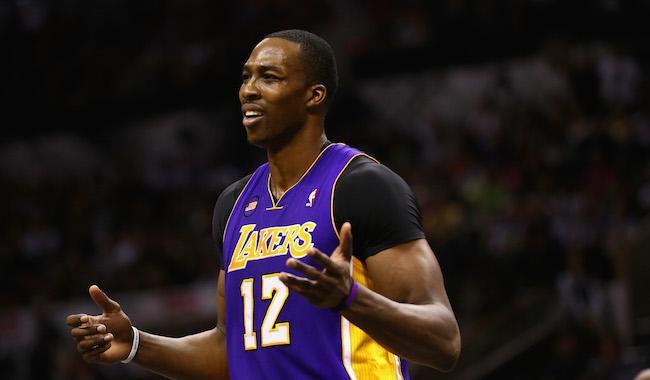
Once one of the NBA’s most dominant players, Dwight Howard is in Charlotte looking to revitalize his career after bottoming out in Houston and Atlanta in recent years. Howard’s fall from grace can be traced back to his decision to push his way out of Orlando in an effort to get to a major market like Brooklyn or Los Angeles.
Eventually, he ended up with the Lakers where he famously clashed with Kobe Bryant in his one year in L.A., before moving on to Houston, where his decline continued until he was but a shell of his former self. The trade to Los Angeles and subsequent labrum injury combined to sap Howard of any and all confidence in his game, and in a new, much brighter spotlight he wilted.
As Howard told Sports Illustrated‘s Lee Jenkins recently, he found himself lost and not trusting his own game. Howard grasped at straws, trying to mimic anyone and everyone, from Shaq to Kobe to Wilt, but could never figure out what he was supposed to be on a new team and in a rapidly changing NBA.
“I lost confidence in who I am as a player,” he recalls. “I’d hear people say, ‘You should play more like Shaq,’ so I tried to bully guys. But that didn’t work because I’m not as big as Shaq. Then I’d hear people say, ‘You smile too much, you should be more like Kobe,’ so I tried to put on a mean face and play mad. But I wound up getting all these stupid techs and flagrant fouls.” He even threw on a headband and kneepads, like Wilt Chamberlain, masquerading as any great Laker except Dwight Howard. He grew anxious enough that he occasionally called friends at halftime and asked what they thought of his performance.
In Houston, Howard’s issues continued, with his relationship with Rockets star James Harden festering under the surface rather than publicly as it had with Kobe. As Howard recalls, he and Harden both were non-confrontational stars, which made that relationship even worse than with Bryant because nothing ever got discussed.
“James is not the kind of guy who is going to say, ‘Yo, man, you got a problem?’ and I’m not either,” Howard says. “When I don’t like what’s going on, I tend to shut down, put my headphones on and ignore everything. I don’t talk about things. That happened to me in L.A. It happened to me again in Houston. I should have communicated better.” One Rockets official called a meeting with Howard and Harden that felt more like an intervention. Harden voiced what he wanted from Howard, namely stronger screens and tougher rim protection, but Howard didn’t express much in response. The freeze deepened.
Howard points as much to the mental side of the game for his decline as his loss of physical ability from injuries. Most fans point to his back issues as what sapped him of his other worldly athleticism that made him one of the league’s most dominant figures in the late 2000s, but Howard seems to still believe there’s plenty of ability there, so long as he has the confidence to be himself.
The problem, as we saw in his stint with Atlanta, is that the NBA has evolved and a player like Howard was in 2009 isn’t nearly as effective or dominant in today’s league. Howard was fairly productive in Atlanta during the regular season, but was nearly unplayable in the playoffs due to the pace of the game and Atlanta’s need for more spacing.
In Charlotte, he’s reunited with Steve Clifford who was an assistant in Orlando and Los Angeles with Dwight, and that has many hoping for a revival. However, until Howard embraces the parts of his game that can still be dominant and effective in the NBA today (like being a roll-man in a pick-and-roll heavy offense) and move past the dream of being a post-scorer like Shaq, a career revitalization won’t happen.






